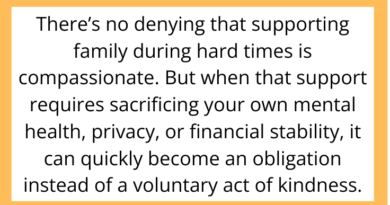AITAH for Refusing to Let My Sister Bring Her Dog to Stay at My House During Her Vacation?
When it comes to family, everyone has different expectations about what support should look like. Sometimes, those expectations clash—and suddenly, you’re left wondering if you’re the villain in your own story. Today’s scenario from the r/AITAH community dives into exactly that: Are you heartless for saying no to a family member’s seemingly harmless request?
Let’s get into the details.
The Situation: A Houseguest with Four Paws

A 32-year-old woman—let’s call her Emily—shared that her sister, Megan, recently asked for a big favor. Megan planned a three-week vacation overseas with her partner and wanted to leave her large Labrador, Rocky, with Emily.
Emily owns her own home and has no pets. She works full time and travels for business regularly. In short, she values a clean, quiet living space. Megan, on the other hand, insisted that Rocky is well-behaved and that Emily “wouldn’t even notice he’s there.”
Emily declined the request, explaining that she wasn’t comfortable caring for a large dog for weeks on end. She suggested Megan hire a pet sitter or board Rocky at a kennel.
Megan did not take this well. She accused Emily of being selfish, uncaring, and unwilling to help family in a time of need. Other relatives chimed in, saying Emily was making things unnecessarily difficult and that it would cost Megan hundreds of dollars to board the dog.
Now Emily is left wondering: Am I the villain here for refusing to watch my sister’s dog?
The Argument: Is Family Obligated to Help?

Emily’s Side: Boundaries and Personal Comfort
Emily emphasized that she has no experience caring for large dogs, and her job requires frequent overnight trips. She worried about Rocky being stressed in a new environment and feared damage to her furniture and floors.
More importantly, she felt it wasn’t her responsibility to rearrange her life for someone else’s vacation.
“I love my sister,” Emily wrote. “But I didn’t sign up to be her pet-sitter.”
She also pointed out that Megan planned this vacation months in advance but only asked for help days before leaving—leaving Emily feeling cornered.
Megan’s Side: Family Should Support Each Other
From Megan’s perspective, Emily’s refusal wasn’t just inconvenient—it felt like a betrayal. In her mind, this was a simple ask: watch a dog for a few weeks, save hundreds of dollars, and do a good deed for a loved one.
Megan argued that Emily has plenty of space and that Rocky is a gentle, loving dog who would adapt quickly.
“She knew I was planning this trip,” Megan told the family. “How hard is it to let him stay? He just needs food, walks, and a little love.”
Reddit Weighs In: Not the Villain, But Not Everyone Agrees

When Emily posted her dilemma, the AITAH community responded swiftly. The consensus was clear: Emily is not the villain.
Top comments included:
-
“You are not obligated to take on the responsibility of a large pet just because you’re related.”
-
“She’s asking you to take care of her dog for nearly a month. That’s not a small favor.”
-
“Boundaries are healthy. You offered reasonable alternatives.”
Still, a few voices argued that Emily could have helped if she truly valued her relationship with Megan.
“If you have space and no allergies, why not help her out?” one commenter asked. “This is what family does.”
The Bigger Issue: Guilt Trips and Entitlement

This situation shines a spotlight on a common problem: some people assume family means automatic yes.
Emily’s story shows how quickly “a favor” can spiral into guilt trips and hurt feelings. Just because you can help doesn’t mean you must. And when someone plans a vacation without arranging proper pet care, that’s not your problem to solve.
Boundaries don’t make you unkind. They make you honest.
The Slippery Slope of Small Concessions

One theme Reddit users repeatedly pointed out: once you agree to something you’re uncomfortable with, it becomes the expectation.
Say yes this time, and next time it’s not three weeks—it’s six. Or Megan may plan trips assuming Emily will always be available to watch Rocky.
Establishing clear limits early helps prevent resentment later.
What Could Emily Have Done Differently?
While Emily was within her rights to say no, here are a few ways she could have softened the impact:
-
Offer to keep Rocky for a day or two until Megan finds alternative care.
-
Help research reputable pet-sitting services.
-
Offer to check on Rocky daily if he stayed with a local friend.
But ultimately, she was clear and polite—and sometimes that’s all you can do.
Takeaway: No Is a Complete Sentence

This AITAH scenario reminds us that saying no doesn’t make you a bad person. It makes you someone who knows your limits.
Family should support each other—but support doesn’t always mean sacrificing your comfort or peace of mind.



